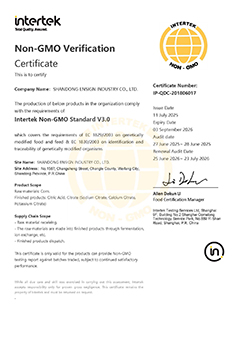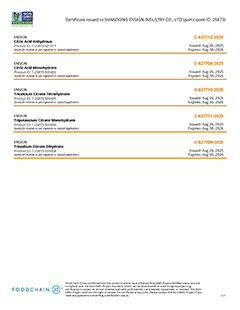
Certificate
Management Profile
|
|
|
|
ISO9001 | ISO14001 | ISO45001 | ISO22000 |
|
|
|
|
FSSC22000 | BRCGS | FAMI-QS | HACCP |
|
|
| 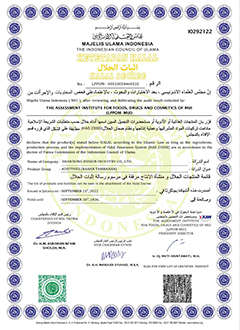 |
GMP | IP | CERTIFICATE OF NON GMO PROJECT COMPLIANCE | MUI HALAL |
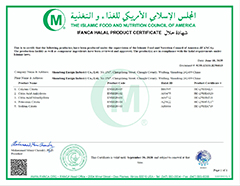 | --240-fa8d83c7-b8bc-4600-882d-75566feb6710.jpg) | 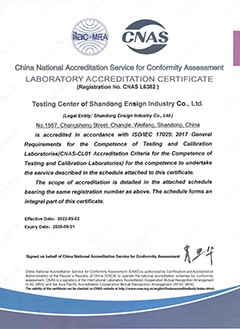 | 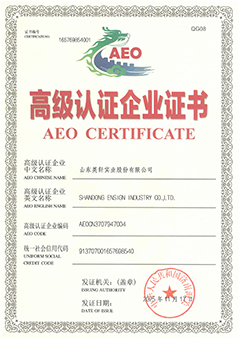 |
IFANCA HALAL | OU KOSHER | CNAS | AuthorizedEconomic Operator |
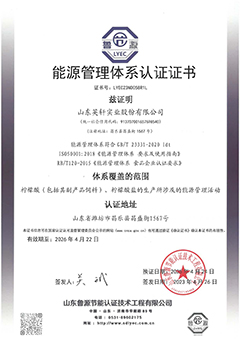 | 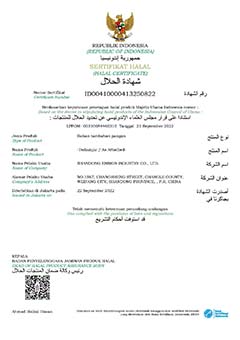 | 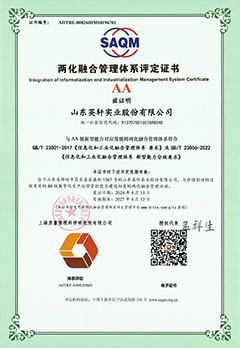 | |
ISO 50001Energy Management System | BPJPH HALAL | Integration of Informatization and IndustrializationManagement System Certification |
1、ISO9001 Quality Management System Certification
It is the most mature quality framework in the world to date. It is not only a Quality Management System, but also establishes criterion for overall management system. ISO9001 assists the enterprise in achieving success by means of improving customers’satisfaction, prompting employee's enthusiasm and continuous improvement.
An enterprise's attainment of this certification demonstrates that it has achieved international standards in the integration of various management systems and it can consistently provide customers with qualified products that meet expectations and satisfy customers.
2、ISO 14001 Environmental Management System Certification
Aiming at global environmental pollution and environmental issues, this system is established to prevent adverse impacts on the environment and to comply with the needs of international environmental protection and international economic and trade development.
After an enterprise passes this certification, what can be proved is that it has reached the international level in environmental management; what can be ensured is that the control of pollutants in various activities of the enterprise meets relevant requirements and the management in all aspects is comprehensively optimized, achieving the control on minimal environmental impact, lowest material and energy consumption, lowest cost, and lowest environmental risk.
3、ISO 45001 Occupational Health and Safety Management System Certification
It is the management system standard applicable to any organization's occupational health and safety, the verification standard of international safety and health management system, and the foundation for organizing the enterprise to establish an occupational health and safety management system.
Through the operation of the system, the enterprise is provided with a set of management methods for controlling risks, which reduces and prevents life, property, and time losses caused by accidents.
4、ISO 22000 Food Safety Management System Certification
This standard is established in response to customer expectations and social responsibilities. It expresses the common requirements in food safety management, not the specific requirements for any type of organization in the food chain. This standard applies to all organizations in the food chain that wish to establish a food safety assurance system, regardless of their size, type, and the products they provide.
After passing this system certification, the enterprise can be provided with a framework on constructing a food safety management system, the food safety risks in various activities of the enterprise can be effectively controlled, and simultaneously its ability to control food safety hazards and those factors affecting food safety can be proved.
5、FSSC 22000 Food Safety System Certification
This standard is created for food manufacturers. It is a global and auditable food safety management system standard that integrates requirements such as the ISO22000 food safety standard and the Publicly Available Specification (PAS) 220 for food safety.
The passing of this system certification indicates that the enterprise has established a comprehensive management system and fully meet customer and industry regulatory requirements regarding food safety.
6、 BRCGS Food Safety Global Standard Certification
BRCGS (BRC Global Standard) Food Safety Global Standard, as the earliest standard recognized by GFSI, has been used by many countries and suppliers globally.
BRC, originally British Retail Consortium, after being acquired by the LGC Group, the meaning of BRC changed to Brand, Reputation through Compliance. BRCGS standards ensure the standardization of product quality, safety, and operational standards, and ensure manufacturers fulfill their legal obligations, providing protection for the end consumer. BRCGS standard certification is often a basic requirement for major retailers, manufacturers, and food service organizations now.
7、FAMI-QS European Feed Additives and Pre-Mixtures Quality System Certification
It is the code of practice formulated by EU authorities for feed additive and pre-mixture producers in support of the implementation of EU feed regulations, establishing a mandatory certification for feed additives and pre-mixtures entering the EU market. It integrates different recognition requirements among EU Member States and stands as the only applicable quality and safety control system throughout Europe for the production of feed additives and additive pre-mixtures.
After obtaining the certification, the enterprise gain recognition across EU countries, avoiding the multiple inspections; simultaneously, it breaks down technical barriers to trade, complies with EU regulatory requirements, and enables the smooth export of feed additive products to EU nations.
8、HACCP Hazard Analysis and Critical Control Point Verification of Compliance
The HACCP system is a management system established on the basis of good food hygiene management of the enterprise. It is a preventive food safety control system that attaches importance to the analysis and control of each link of the food enterprise's business activities, making them related to food safety.
The passing of the certification indicates that the enterprise can effectively prevent or eliminate hazards to food safety.
9、GMP (Good Manufacturing Practice) Verification of Compliance
GMP (Good Manufacturing Practice) is a set of mandatory standards applicable to industries such as pharmaceuticals and food. It requires the enterprise to meet hygiene and quality requirements according to relevant national regulations in terms of raw materials, personnel, facilities and equipment, production processes, packaging and transportation, quality control, etc., forming a set of operational work norms.
The passing of the certification is helpful to the enterprise’s improvement on their hygiene environment and discovery of problems existing in the production process, to make improvements.
10、 IP Non-GMO Verification
This certification focuses on the impact of genetically modified (GM) components in the production and processing chain on the non-GMO safety of the product. It establishes a whole-process quality control system from the production base, production process, handling, processing, storage, transportation to sales, to ensure the non-GMO identity of the product, ensure the produced products are non-GMO products, with an assurance system being established.
The passing of the certification indicates that the enterprise can prevent the product from being contaminated by GM components throughout the entire production supply chain, from planting to harvesting, transportation (export), processing, and entering the market, ensuring the purity of non-GMO products.
11、FoodChain ID NGP Product Verification
NGP (NON-GMO Project) is a non-profit organization dedicating to preserve and build sources of non-GMO products, educate consumers, and provide verified non-GMO choices. This project provides the only third-party verification and labeling for non-GMO food and products in North America and is committed to educating consumers and the food industry.
FoodChain ID, formerly known as Genetic ID, is a pioneer in the genetically modified food identification industry. It was the first Technical Administrator to collaborate with the NGP, having verified over 50,000 products. It has consistently been at the forefront of the new food industry, providing worldwide expertise to meet the demand for greater transparency, accountability, safety, and sustainability. Its technical and business services include providing NGP Product Verification, USDA Organic Certification, BRC and SQF food safety certifications, etc.
12、MUI HALAL Certification
HALAL, originally means“permissible”. HALAL products refer to food, pharmaceuticals, cosmetics, and their additives that comply with the lifestyle and needs of Muslims who adhere to the Islamic faith.
MUI, the Indonesian Ulama Committee, is Indonesia's highest religious authority body and one of the world's most authoritative HALAL certification official bodies. The HALAL certificate issued by it is universally recognized in countries worldwide.
13、IFANCA HALAL Certification
IFANCA, the Islamic Food and Nutrition Council of America, is a globally authoritative Halal certification body. Its services cover food, pharmaceuticals, cosmetics, and other fields. It ensures compliance with Islamic law through strict ingredient and production process audits. Its certification mark (Crescent-M) holds high credibility in international trade.
14、OU KOSHER Certification
KOSHER certification, also known as Jewish certification, refers to the certification of food, auxiliary materials, and additives according to Jewish kashrut.
OU, the abbreviation of the Orthodox Union, is the world's largest and most authoritative Kosher certification body. It is responsible for Kosher certification of enterprise products according to kashrut.
15、CNAS
National laboratory accreditation is a formal recognition granted by CNAS (China National Accreditation Service for Conformity Assessment) to laboratories that have the capability to perform specified types of testing and calibration. Accredited laboratories comply with ISO/IEC 17025: 2017 “General Requirements for the Competence of Testing and Calibration Laboratories”, and possess the service capability within the scope of accreditation.
16、Authorized Economic Operator Certificate
Authorized Economic Operator (abbreviated as AEO) means the highest level of customs credit. After obtaining it, ?not only can the enterprise enjoy the lowest customs examination rate, lowest customs control rate, joint incentive mechanisms brought by various domestic functional departments, but also can enjoy the gold medal effect resulted from international mutual recognition, increasing its international influence, getting assistance in expanding international markets.
17、ISO 50001 Energy Management System Against the backdrop of rising global energy costs and increasingly stringent environmental regulations, the energy management system has become a crucial tool for corporate sustainable development. It significantly reduces energy consumption and improves energy efficiency by optimizing energy mix and implementing digital management.
After passing this certification, the enterprise can reduce energy waste, lower production and operating costs, and achieve energy conservation and emission reduction targets by optimizing energy use plans and identifying key energy consumption links.
18、BPJPH HALAL Certification
BPJPH (Badan Penyelenggara Jaminan Produk Halal) is a Halal product certification agency established by the Indonesian government. It aims to ensure that food, pharmaceuticals, and cosmetics comply with Islamic law requirements. With the expansion of the global Halal Market, this certification has become a mandatory requirement for the enterprise to enter the Muslim Market (all exported food was required to pass BPJPH certification according to the Indonesian regulations in 2025).
19、Integration of Informatization and Industrialization Management System Certification
The Integration of Informatization and Industrialization Management System is a National Standards (GB/T 23001) administered by the Ministry of Industry and Information Technology. It aims to enhance the core competitiveness of the enterprise through digital means. Its background stems from global industrial transformation, with the purpose of promoting the enterprise to achieve business digitization and process intelligence.
The passing of this certification proves that the company has achieved business model innovation, reduced the operating costs of automated processes, avoided common risks in informatization construction (such as System Silos??), broken down departmental barriers, and minimized resource wastage.

-16331957920.jpg)
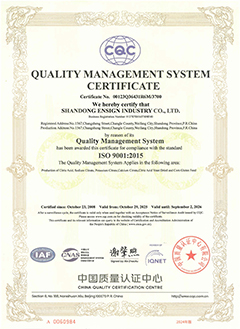
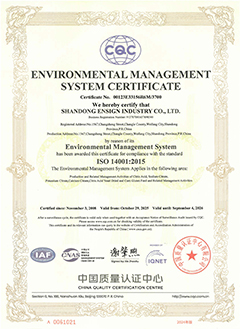
-240-54c42ad2-0747-4cc9-a4eb-c3af554631e3.jpg)
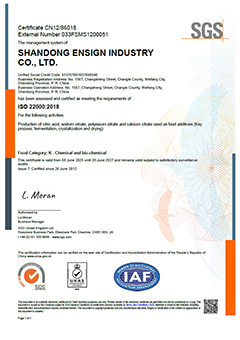
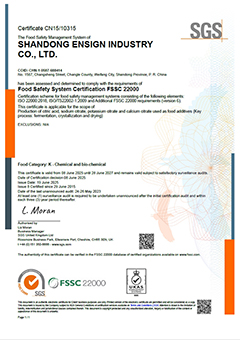
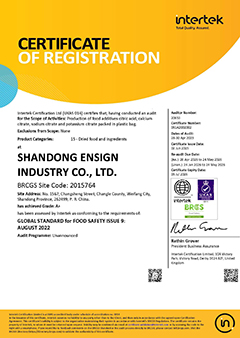
-240-4d02249f-753a-4ae5-99b4-f3fe557028ac.jpg)
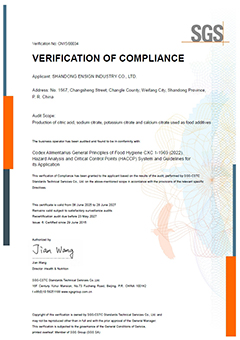
符合性验证-a57d25b6-d9e7-4fed-a318-b29bcfde88bd.jpg)
